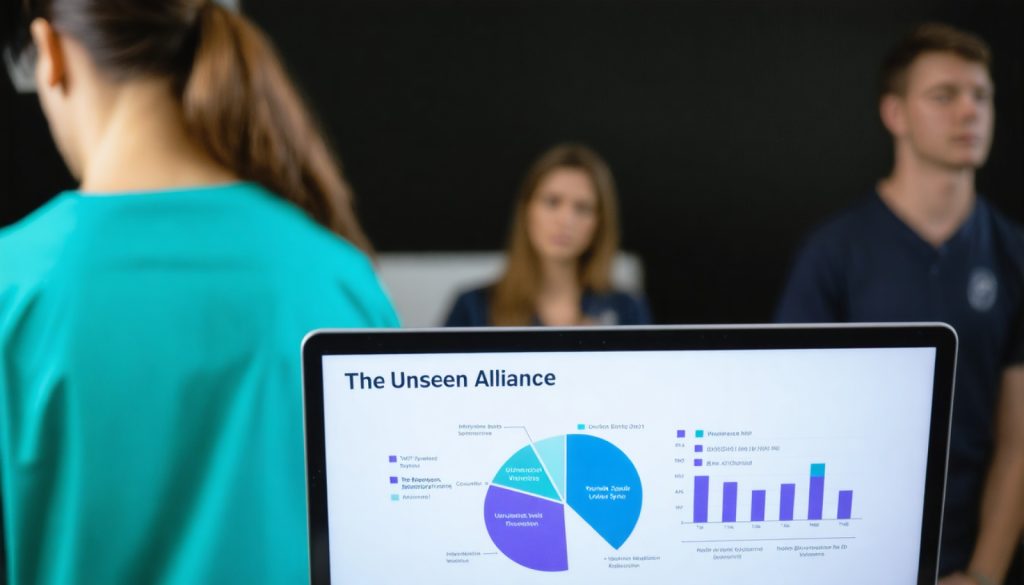
- Arkansas Tech University and St. Mary’s Regional Health System are collaborating to enhance healthcare education.
- The focus is on developing adaptive skills for students in response to technological changes and an aging population.
- Innovative educational models are being designed, emphasizing both clinical precision and empathetic patient care.
- The partnership aims to bridge academia and practical healthcare experience, fostering future-ready healthcare professionals.
- Experiential learning, including visits to hospital facilities, is key to understanding the realities of healthcare work environments.
- The cooperative effort underscores the need for continuous learning and collaboration in achieving effective healthcare delivery.
A gentle bustle filled the conference room at St. Mary’s Regional Health System as key figures from Arkansas Tech University gathered with hospital executives. Against the backdrop of accelerating changes in healthcare, their mission was clear: craft innovative strategies to better prepare future healthcare professionals.
Beneath the sterile glow of fluorescent lights, discussions unfolded around the evolving landscape of healthcare employment. Leaders pinpointed a growing demand for adaptable skills and knowledge due to technological advancements and an aging population, making traditional educational methods seem outdated. The convergence of academia and healthcare, they opined, could be the crucible for tomorrow’s workforce.
Representatives from Arkansas Tech University listened intently. The call was not just to instill textbook knowledge but to harmonize clinical precision with empathetic patient care. This dialogue heralded a transformative educational model—one that emphasizes agility and resilience in an ever-shifting healthcare environment.
After the meeting’s cerebral exchanges, the ATU delegation toured St. Mary’s facilities. They witnessed firsthand the urgency and vitality of hospital life, from the rhythmic beeping of monitors in the ICU to the hushed conversations in waiting rooms. This tangible experience unlocked a new understanding: learning extends beyond textbooks to the very pulse of human interaction and care.
As the sun dipped below the horizon, hinting at the close of an important day, participants left with a shared vision. Their cooperative efforts underscored an essential truth—effective healthcare demands more than just knowledge; it requires collaboration, innovation, and a deep commitment to continuous learning.
This partnership between Arkansas Tech University and St. Mary’s Regional Health System isn’t merely a dialogue of hopes; it is a pragmatic step toward preparing healthcare providers who are ready not just for today’s challenges, but those looming on tomorrow’s horizon. A stronger educational alliance today promises a healthier society tomorrow.
Revolutionizing Healthcare Education: How Arkansas Tech University is Paving the Way
Introduction
In an era where technological advancements and an aging population are reshaping the healthcare landscape, educational institutions and healthcare providers must join forces to prepare the next generation of healthcare professionals. The collaboration between Arkansas Tech University (ATU) and St. Mary’s Regional Health System stands as a beacon for such transformative educational models. This article delves deeper into the facets of this partnership and its broader implications for the healthcare sector.
Emerging Healthcare Trends
1. Technological Integration: The healthcare sector is rapidly embracing technology, from electronic health records to telemedicine and AI-assisted diagnostics. This requires future healthcare professionals to be adept in digital literacy alongside traditional medical expertise.
2. Aging Population: The increasing number of elderly patients necessitates specialized knowledge in geriatric care, implying that curricula must adapt to include such specialized fields.
3. Emphasis on Soft Skills: Empathy, communication, and collaboration are indispensable in providing patient-centered care, as highlighted during the discussions at St. Mary’s. These skills, often overlooked, are critical in fostering trust and improving patient outcomes.
How-To Steps for Innovative Education Models
1. Curriculum Revamp: Incorporate technology-related courses, such as health informatics and geriatric care, into the healthcare education curriculum.
2. Simulation-Based Learning: Utilize advanced simulation tools to provide hands-on experience in a controlled environment.
3. Interdisciplinary Approach: Encourage students from different healthcare disciplines to collaborate on projects to replicate real-world scenarios.
Real-World Use Cases
– Telehealth Training: ATU can integrate telehealth modules to educate students on remote patient diagnosis and care, preparing them for a digitally-driven healthcare landscape.
– Community Engagement: Initiating programs where students provide voluntary healthcare services under supervision can enhance their learning and societal impact.
Reviews and Comparisons
Educational models that incorporate practical experiences and interdisciplinary learning, like the one proposed by ATU and St. Mary’s, have been shown to produce more competent and confident healthcare professionals. Studies indicate that students exposed to such models have higher employment rates and report greater job satisfaction.
Controversies and Limitations
One concern with increased digital integration is data privacy and cybersecurity. Ensuring that students receive appropriate training on how to protect patient data is vital.
Insights and Predictions
Experts predict a surge in demand for healthcare professionals skilled in both clinical and technological domains. The proactive steps taken by ATU and St. Mary’s position them as leaders in this inevitable transition.
Actionable Recommendations
1. Continuous Learning: Both healthcare professionals and students should engage in lifelong learning to stay abreast of technological advancements.
2. Networking and Collaboration: Facilitators should encourage students to attend workshops and seminars that bring together academia and industry leaders.
Conclusion
The partnership between Arkansas Tech University and St. Mary’s Regional Health System exemplifies a forward-thinking approach to healthcare education. By embedding adaptability, technological proficiency, and soft skills into their curriculum, they are not just preparing healthcare professionals for today’s challenges but are equipping them for the future.
For more insights on innovative educational partnerships and healthcare trends, visit Arkansas Tech University and St. Mary’s Regional Health System.



